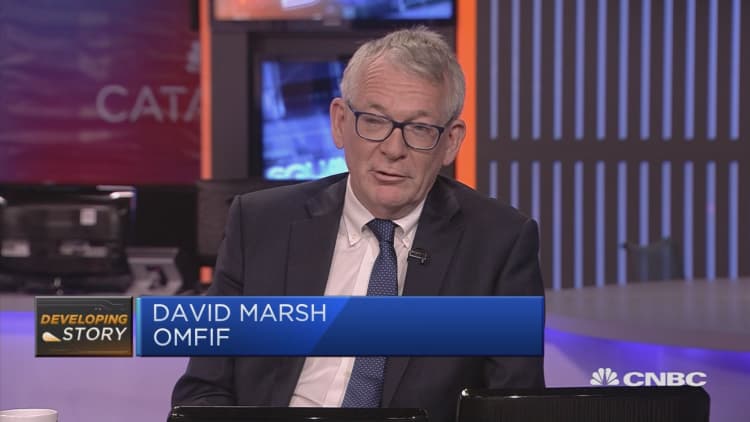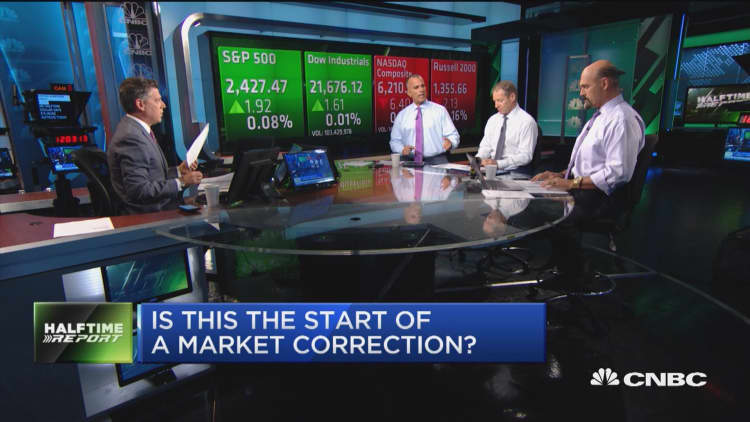A market correction is on the horizon and it could happen in the next two months, an investment manager told CNBC Tuesday.
"We believe there is a certain probability for a market correction over the coming two months, however, there is no inevitability for this to happen. What would be required is a trigger," Lothar Mentel, chief executive officer and chief investment officer at Tatton Investment Management, told CNBC via email Tuesday.
Many investment managers and analysts have been talking about a market correction after the strong stock performances in Europe and the U.S. since the start of the year. The S&P 500 is up about 10 percent since January this and Europe's Stoxx 600 is up by about 3 percent year-to-date.
David Marsh, managing director of OMFIF, an independent think tank, told CNBC earlier this week: "We are approaching a peak, if we haven't reached it already, and I think we are due a correction anyway and we're going to be seeing some good reasons for that."

The total return of the S&P 500 index hit its annualized average (over the past 90 years) in just under half a year in 2017 - meaning that investors have made in half of the year what they used to do over an entire year for the past 90 years. Investors have also run to European equities throughout the year on positive economic data and strong earnings. However, the party could come to a close soon, if the right trigger takes place.
"In our opinion, the highest risk/probability for such a trigger event is still a slowdown in China – not (yet) North Korea or Trump," Mentel from Tatton Investment Management said.
China, Geopolitics, Monetary Policy
China is seen by many as a great risk to the world economy due to its pile of debt and lower economic growth. The International Monetary Fund (IMF) warned last month that China could spark the next financial crisis.
"The growth outlook has been revised up reflecting strong momentum, a commitment to growth targets, and a recovering global economy," the IMF said last month. "But this comes at the cost of further large and continuous increases in private and public debt, and thus increasing downside risks in the medium term."

The recent escalation of words and actions between North Korea and the United States has also sent jitters across global markets. The dollar has lost some strength since January with the currency index down nearly 10 percent. Investors have flocked to European equities and safe haven assets such as gold and the Japanese yen as a result.
European economy has been growing and showing signs of recovery. The performance of European companies, the reduced political risk, and the economic momentum have lured investors to scoop up equities. The CBOE Volatility Index, commonly referred to as the VIX, hit its lowest level since 1993 in May after President Emmanuel Macron was elected in France. But the index has started to edge higher on the back of geopolitical tensions in the Korean peninsula.
According to Christian Hille, head of multi asset at Deutsche Asset Management, the geopolitical escalation in North Korea leading to a risk-off movement which could trigger unwind of extensive short volume positions could also be a potential reason for a market correction.
"In general, going into Autumn with European Central Bank (ECB) and Federal Reserve meetings ahead, some misinterpretation/miscommunication (central bank failure) could lead to market stress with rates moving higher substantially, spread widening, equity market drop, etc," he said, though highlighting that this isn't his base case scenario.
Recession? Maybe not until 2019
However, Mentel from Tatton Investment Management said monetary policy is the second highest risk to a market correction.
"The second highest is in our view that markets throw a tantrum over the U.S. quantitative easing unwind announcement," he said.
Markets have been working on the assumption that the U.S. Federal Reserve will continue raising interest rates and slowly removing its stimulus. However, such assumptions have recently become less clear cut with investors worrying about lack of policy delivery by the U.S. administration, which has promised a range of fiscal policies including tax cuts and infrastructure spending that could support Fed's normalisation policy.
While many analysts in the meantime have pointed to the possibility of a recession in the U.S., Hille, from Deutsche Asset Management, doesn't think there will be a recession before 2019.
"We expect risk markets to grind higher at the margin but at a moderate pace with central banks keeping the balance between slow normalisation but still accommodative enough to support low fixed income yields and spreads as well as equity valuations underpinned by solid earnings growth," he said.
"U.S. recession in 2019 at the earliest, hence further room to go."


